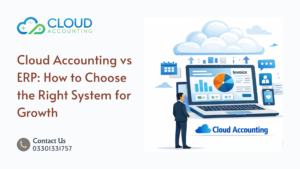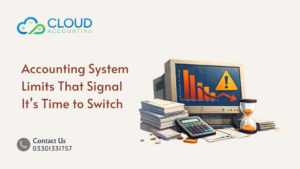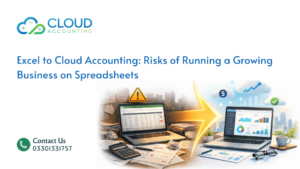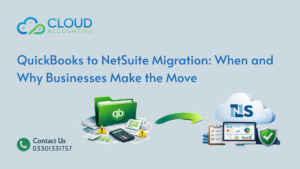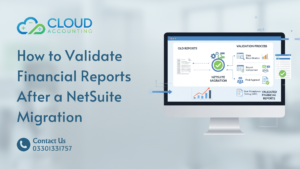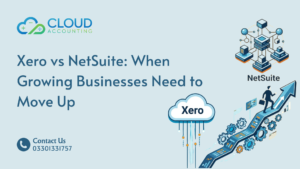Running a small business is like juggling flaming torches while riding a unicycle—you’re managing sales, customers, and operations, all while keeping an eye on your finances. Sound familiar? If you’re a small business owner, you know that every minute and every dollar counts. That’s where cloud accounting for small business comes in, offering a game-changing solution to streamline your financial management. In 2025, with small businesses driving 44% of U.S. economic activity, leveraging small business financial solutions like cloud accounting can set you apart from the competition. Let’s dive into how cloud accounting benefits empower small businesses, focusing on accessibility, cost savings, security, and scalability for growth.
How Cloud Accounting Supports Small Businesses
Imagine this: You’re at a networking event, and a potential client asks for a quick financial overview of your business. With traditional accounting, you’d be stuck waiting to get back to your office computer. But with cloud accounting for small business, your financial data is just a tap away on your phone. Cloud accounting is a modern approach where your accounting software and data live on secure, remote servers, accessible via the internet. Unlike clunky desktop software, cloud-based platforms like QuickBooks Online, Xero, or Wave let you manage invoices, track expenses, and run reports from anywhere, anytime.
For small businesses, this flexibility is a lifeline. Whether you’re a freelancer, a boutique retailer, or a startup, cloud accounting benefits include automating tedious tasks, integrating with other tools, and providing real-time insights. In fact, Forbes reports that 78% of small businesses now use cloud-based accounting for its efficiency and affordability. By replacing manual processes with small business financial solutions, cloud accounting helps you focus on growth rather than paperwork. Let’s explore the top benefits that make it a must-have for small businesses in 2025.
Key Benefits of Cloud Accounting: Accessibility, Cost Savings, and Security
1. Unmatched Accessibility
Picture yourself on a weekend getaway, sipping coffee by the lake, when you realize you need to send an invoice or check your cash flow. With cloud accounting for small business, you can log into your accounting platform from your phone, tablet, or laptop and get it done in minutes. This anytime, anywhere access is a cornerstone of cloud accounting benefits, allowing small business owners to stay on top of finances without being chained to a desk.
Moreover, cloud accounting fosters collaboration. Your bookkeeper can update records while you review reports, all in real-time, without emailing spreadsheets back and forth. For example, platforms like Xero allow multiple users to access the same data simultaneously, ensuring everyone stays on the same page. As a result, you can make informed decisions faster, whether you’re meeting a client or planning your next big move.
2. Significant Cost Savings
Small businesses often operate on tight budgets, so every penny saved counts. Traditional accounting software requires upfront investments in licenses, servers, and IT maintenance, not to mention the cost of hiring staff to manage it all. In contrast, cloud accounting for small business operates on a subscription model, with affordable plans starting as low as $10-$30 per month, according to NerdWallet’s 2025 guide. This eliminates the need for expensive hardware or IT support.
Additionally, cloud accounting automates time-consuming tasks like invoicing, expense tracking, and bank reconciliation. For instance, QuickBooks Online can sync with your bank account to categorize transactions automatically, saving hours of manual data entry. By reducing labor costs and minimizing errors, small business financial solutions like cloud accounting boost your bottom line. Plus, automatic software updates mean you’re always using the latest features without extra fees, keeping your costs predictable and manageable.
3. Robust Security
Data security is a top concern for small businesses, especially when handling sensitive financial information. You might worry about storing your data in the cloud, but reputable cloud accounting providers invest heavily in security measures that often surpass what small businesses can achieve on their own. Platforms like Wave and Xero use bank-grade encryption, multi-factor authentication, and regular backups to protect your data, as noted in TechRadar’s 2025 review.
For example, if your office computer crashes or gets stolen, your financial data remains safe in the cloud, accessible from any device. This is a stark contrast to local systems, where a single hardware failure could wipe out years of records. Furthermore, cloud providers comply with regulations like GDPR and CCPA, ensuring your business stays compliant. With cloud accounting benefits, you get peace of mind knowing your financials are secure and recoverable, no matter what happens.
4. Streamlined Processes for Efficiency
Running a small business means wearing multiple hats, and time is your most valuable resource. Cloud accounting for small business streamlines processes by automating repetitive tasks. For instance, you can set up recurring invoices for regular clients, automate payment reminders, or integrate with payment gateways like Stripe to get paid faster. According to Forbes, businesses using cloud accounting save an average of 10 hours per week on administrative tasks.Additionally, cloud platforms integrate seamlessly with other tools like CRM systems, e-commerce platforms (e.g., Shopify), or payroll software. This creates a cohesive ecosystem where data flows effortlessly, reducing the risk of errors from manual data entry. As a result, you can spend less time crunching numbers and more time serving customers or growing your brand.
5. Real-Time Financial Insights
In the fast-paced world of small business, waiting for monthly reports to understand your financial health is a thing of the past. Cloud accounting benefits include real-time insights that empower you to make data-driven decisions on the spot. Platforms like QuickBooks Online offer customizable dashboards that display key metrics like cash flow, profit margins, and outstanding invoices at a glance.
For example, if you’re considering a new marketing campaign, you can check your budget in real-time to ensure you have the funds. These insights help you spot trends, identify cost-saving opportunities, and plan for the future with confidence. By providing a clear picture of your financials, small business financial solutions like cloud accounting give you the agility to stay ahead in a competitive market.
Scalability for Growth
One of the biggest challenges for small businesses is scaling operations without breaking the bank. As your business grows—whether you’re adding new products, expanding to new markets, or hiring more staff—your accounting needs become more complex. Cloud accounting for small business is designed to grow with you, offering unmatched scalability without the hefty price tag of traditional systems.
For instance, if your sales double during the holiday season, cloud platforms like Xero can handle increased transaction volumes without requiring new hardware or software upgrades. You can add users, integrate new tools, or manage multi-currency transactions for international sales with ease. According to Software Advice, 65% of small businesses cite scalability as a key reason for adopting cloud accounting.
Moreover, cloud accounting supports global expansion. If you start selling internationally, platforms like Wave offer multi-currency support and compliance with local tax regulations, simplifying cross-border transactions. This flexibility ensures your accounting system evolves with your business, whether you’re a solo entrepreneur or a growing SME with multiple locations.
Call-to-Action: Get Started with Cloud Accounting Today
Ready to take your small business to the next level in 2025? Don’t let outdated accounting methods hold you back. Embrace cloud accounting for small business and unlock the benefits of accessibility, cost savings, security, and scalability. Explore platforms like QuickBooks Online, Xero, or Wave to find the perfect fit for your needs. For personalized guidance, contact an eSeller Accountant to set up and optimize your cloud accounting system. Schedule a free consultation today at Xero’s Advisor Directory or QuickBooks’ Find-a-ProAdvisor and start streamlining your financials now.
Visualizing Success: The Image Idea
Imagine a vibrant image of a small business owner working from a cozy coffee shop, smiling confidently as they check their financial dashboard on a tablet. The screen displays a sleek cloud accounting interface with colorful charts showing cash flow and invoices. In the background, a subtle cloud graphic symbolizes secure data storage, with icons for accessibility (a globe), cost savings (a piggy bank), and scalability (a growth arrow). The scene captures the freedom and control that cloud accounting benefits bring to small business owners.
Conclusion
In 2025, small businesses need every advantage to thrive in a competitive landscape. Cloud accounting for small business delivers just that, offering small business financial solutions that save time, cut costs, and support growth. With unmatched accessibility, robust security, and the ability to scale seamlessly, cloud accounting empowers you to focus on what you do best—running your business. Don’t wait to upgrade your financial management. Embrace the cloud accounting benefits today and position your small business for success in the years ahead.


